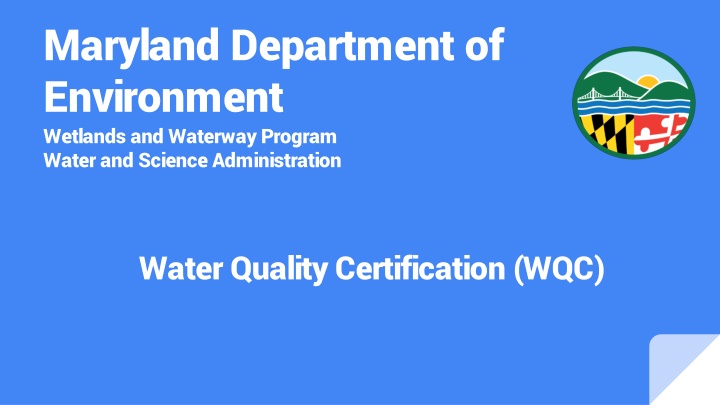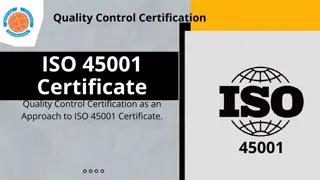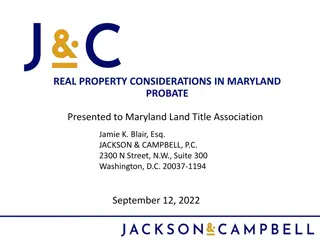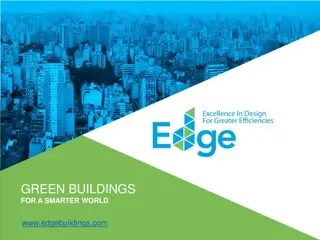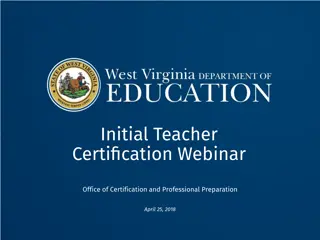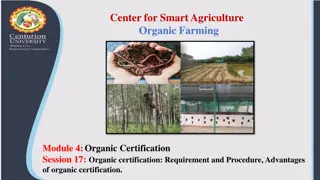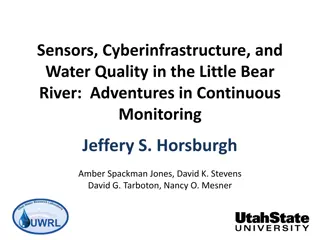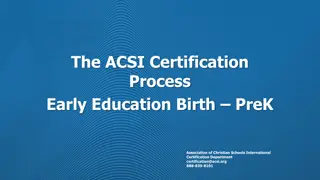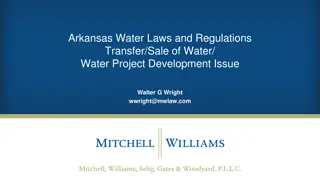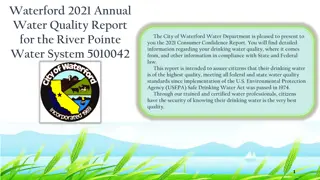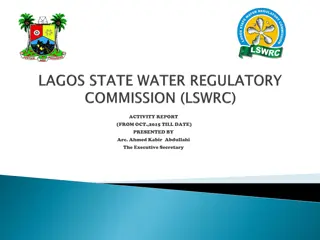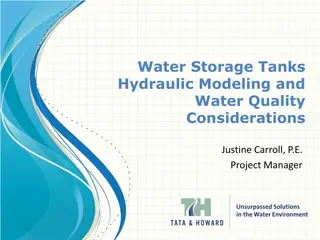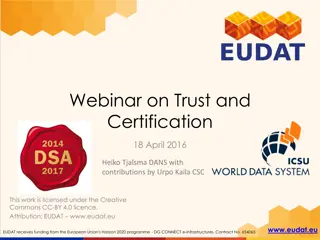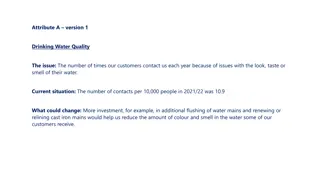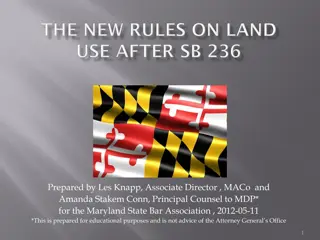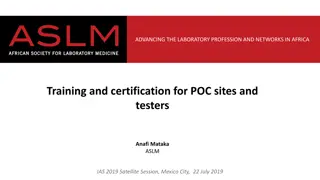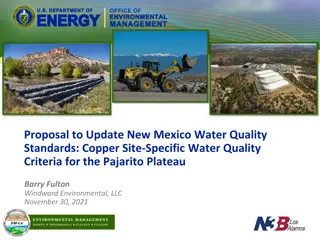Maryland Water Quality Certification Regulations Overview
Maryland requires a Section 401 certification for federal licenses or permits authorizing activities that could result in a discharge. The certifying authorities must respond within a reasonable period, typically 60 days. Recent changes have impacted the process, shifting from a one-year timeframe to a stricter 60-day deadline for decision-making. Maryland evaluates its regulations to meet the new requirements.
Download Presentation

Please find below an Image/Link to download the presentation.
The content on the website is provided AS IS for your information and personal use only. It may not be sold, licensed, or shared on other websites without obtaining consent from the author.If you encounter any issues during the download, it is possible that the publisher has removed the file from their server.
You are allowed to download the files provided on this website for personal or commercial use, subject to the condition that they are used lawfully. All files are the property of their respective owners.
The content on the website is provided AS IS for your information and personal use only. It may not be sold, licensed, or shared on other websites without obtaining consent from the author.
E N D
Presentation Transcript
Maryland Department of Environment Wetlands and Waterway Program Water and Science Administration Water Quality Certification (WQC)
When is a Section 401 certification required in Maryland? A CWA Section 401 certification is required for any federal license or permit that authorizes an activity that may result in a discharge. Examples: U.S. Army Corps of Engineers (ACOE or Corps) permits (Nationwide Permits, Regional General Permits, State Programmatic General Permits, Standard Individual Permits), FERC, USCG
How long does Maryland have to make a certification decision? CWA Section 401 requires that certifying authorities act on a certification request within a reasonable period of time, which shall not exceed one year. As allowed under the Rule, the federal licensing or permitting agency establishes the reasonable period of time and may adopt that reasonable period of time into the federal licensing agencies regulations. ACOE has regulations stating that the reasonable period of time for a state to make a decision is 60 days, unless the District Engineer decides more or less time is reasonable.
2019 ACOE Regional General Letter (RGL) In August 2019, ACOE Headquarters issued an RGL requiring that the ACOE abide by its regulations and required WQC decisions within 60 days, unless the state has requested and received an extension to that time. When establishing the reasonable period of time in a state extension request, as in the final rule, the ACOE is required to consider the complexity of the proposed project, the nature of any potential discharge, and the potential need for additional study or evaluation of water quality effects from the discharge. Administrative procedures, for example, satisfying a state s regulatory requirements regarding public notice or hearing requirements would be dismissed as an acceptable reason for granting an extension.
ACOE 2019 RGL Prior to the ACOE 2019 RGL- The ACOE Districts governing Maryland publicly noticed when a Standard Individual Permit (SIP) is required. In Maryland the ACOE notice stated that Maryland had up to one-year to make a WQC decision for a majority of projects that required a WQC. By this notice, ACOE automatically granted an extension to the 60-days in ACOE regulation as reasonable through the public notice.
ACOE 2019 RGL Post ACOE 2019 RGL- In Maryland ACOE stopped public notice publications determining one year was reasonable, instructed applicants to obtain a WQC from Maryland, implemented the hard 60-day deadline for a WQC decision for all qualifying projects and required extension requests be submitted from Maryland for ACOE approval. Maryland evaluated its WQC regulations and determined that in order to preserve the timeclock for a state WQC decision, that it needed to immediately implement new WQC processing procedures.
2020 New Rule, Section 401 At about the same time in 2019, EPA was being directed to reevaluate Section 401 (April 2019 E.O. 13868) June 2020 EPA finalized a New Rule, effective September 11, 2020. Both the 2019 RGL and the 2020 WQC Rule required Maryland to evaluate its WQC process and implement changes.
Marylands WQC Requests 4 Important Steps 1. Determining a WQC is required. 2. Submit Pre-filing Meeting Request. 3. Map out the timeclock to a decision. 4. Submit in writing a WQC request in accordance with Section 401 and COMAR requirements.
HOW DO I KNOW IF MY PROJECT NEEDS AN INDIVIDUAL WQC? The federal licensing or permitting agency will advise you if your project requires an Individual WQC from Maryland. ACOE will inform you based on how they are categorizing your project activities for a permit. Except for the Finalized 2021 Nationwide Permits (NWPs), a WQC is already issued for a permittee for the MDSPGP, 2017 NWPs, RGPs that are in effect in Maryland.
2020 Rule: PRE-FILING MEETINGS 2020 Rule - requires a project proponent to request a pre-filing meeting with the certifying authority 30- days prior to filing an request for a WQC. The WQC CANNOT be received by Maryland earlier than 30-days from the date of the prefiling meeting request. Maryland does not have to hold a prefiling meeting request or hold a meeting prior to a WQC request, but the project proponent MUST request the meeting and wait 30 days before filing a WQC request. A pre-filing meeting request does not expire -meaning you can request the prefiling meeting and wait the minimum 30 days or wait longer to submit a WQC request for the project subject to the original prefiling meeting request. If the project changes substantially a new pre-filing meeting request may need to be filed. Pre-filing Meeting requests: https://mde.maryland.gov/programs/Water/WetlandsandWaterways/Pages/PreApplicationIntroduction.aspx
When does the Section 401 timeclock begin? The pre-filing meeting request does not start the State timeclock to make a decision on a WQC. It starts only the requestor s timeclock to be able to submit a WQC request. MDE requires a WQC to be mailed with supporting documentation. We do not accept emailed requests. The final rule defines certification request as a written, signed, and dated communication that includes project documents and information as specified in the final rule. The reasonable period of time begins upon receipt by Maryland of a certification request. IMPORTANT TO MAP OUT THE DECISION TIMECLOCK BEFORE YOU SUBMIT A WQC. Submitting at the time of a Joint Federal/State Application for the Alteration of any Floodplain, Waterway, Tidal or Nontidal Wetlands in Maryland (JPA) is NOT recommended or advised. You should wait until you are advised by the Federal licensing or permitting agency that a WQC is required for your project. Once MDE receives a WQC request we evaluate the project, consult with ACOE to determine if it will remain an SIP, then determine whether MD requires longer than 60 days to make a decision. If we do, we submit a written request to ACOE for a reasonable period of time, not to exceed one year.
WQC REQUEST KEY ELEMENTS Key Elements: COMAR 26.08.02.10 establishes what a request for WQC should contain in Maryland as considered KEY ELEMENTS to a WQC request. Section 401 also defines what must be contained in a WQC request. The MDE Key Elements document combines 2020 Rule requirements and COMAR 26.08.02.10 requirements. For WQC associated with a ACOE JPA, other than the necessary statements required under the Rule and COMAR for a request to be considered valid and received, the JPA document attached to a WQC request will contain sufficient information regarding the Key Elements for a WQC review to commence. You will be notified by a MDE reviewer if more information is required for MDE to process the WQC request. Please note that the submission of a JPA is not considered a WQC request. A stand alone WQC request is required. ACOE will inform you if your project requires an Individual WQC after receiving your JPA. MDE has created a WQC Request and Key Element informational document on the website. https://mde.maryland.gov/programs/Water/WetlandsandWaterways/PermitsandApplications/Documents/WQ C_Request_MDE.pdf
2021 Nationwide Permits 2021 Nationwide Permits After an accelerated Rule making process, the ACOE reissued 16 of the proposed NWPs which became effective on March 15, 2021. This left 40 NWP reissuances pending Final decisions. Some of the reissued NWPs that were reissued by the ACOE replace the 2017 NWPs for existing activities and some are new NWPs. Of those 16 NWPs, 12 are suspended for use in Maryland due to the MDSPGP-5 and will continue suspension due to the proposed MDSPGP-6. The 4 NWPs that are active in the ACOE Baltimore District of Maryland are: NWP48. Commercial Shellfish Mariculture Activities NWP52. Water-Based Renewable Energy Generation Pilot Projects- Tidal Waters only NWP55. Seaweed Mariculture Activities NWP56. Finfish Mariculture Activities
2021 Nationwide Permit WQC Decision The ACOE has determined that it will decline to rely on Maryland s WQC issued on December 15, 2020 for the NWPs effective March 15, 2021. This requires applicants qualifying for an NWP in Maryland to seek an Individual WQC for their project prior to beginning work under the NWP. ACOE will notify you of your requirements. It is unclear how this decision may affect the NWPs that ACOE has not reissued. Corps Baltimore District: NWP48. Commercial Shellfish Mariculture Activities NWP52. Water-Based Renewable Energy Generation Pilot Projects- Tidal Waters only NWP55. Seaweed Mariculture Activities NWP56. Finfish Mariculture Activities Corps Philadelphia District: All pre-construction notifications for the 16 2021 NWPs in the Maryland portion of the Chesapeake and Delaware (C&D) Canal will require individual decisions on Section 401 water quality certification for the ACOE Philadelphia District.
Public Notice and Hearing Requirements Public Notice is required for a WQC. MDE will make every effort to combine Public Notice procedures for projects with other regulatory resource impacts that also require public notice (i.e. Nontidal, Waterway, Tidal) to incorporate a WQC request. Public Hearings will be held if a valid request is received during the public notice comment period COMAR requires notice of a WQC hearing to be published in the Maryland Register 45 days prior to the hearing date.
Can MDE or a Requestor STOP the timeclock? No. Once MDE has your WQC request, the decision timeclock and ACOE coordination on decision date begins. Timing of a WQC should be carefully considered and coordinated for sensitive or large scale projects. Take advantage of the Prefiling Meeting tool and draft submission coordination for review. The timeclock ends when MDE takes any of the following available options before the timeclock expires: Grants certification, grants certification with conditions, denies, or expressly waives certification OR; Federal Agency determines waiver has occurred if the timeclock expired and MDE did not take an above action.
Maryland WQC Conditions Under section 401 a State s WQC conditions must be incorporated into a federal permit or license. MDE WQC s have a new look . In accordance with the 2020 WQC Rule each WQC Condition must have a statement of necessity for the protection of water quality and include a legally supportive citation.
Condition New Look Example Condition: The Certification Holder shall adhere to the time of year restrictions, unless waived or amended by the Department, as identified in a state authorization. Statement of Necessity for Condition: Restrictions on instream construction are necessary to protect designated uses for propagation and growth of fish, other aquatic life, and wildlife. Citations: Federal and state laws that authorize this condition include but are not limited to: 33 U.S.C. 1341(a), (b), & (d); 33 U.S.C. 1251(b); 33 U.S.C. 1370; Md. Ann. Code, Env. Article, Title 1, Subtitles 3 and 4; Md. Ann. Code, Env. Article, Title 5, Subtitles 5 and 9; Md. Ann. Code, Env. Article, Title 9, Subtitle 3; Md. Ann. Code, Env. Article, Title 16; COMAR 26.08; COMAR 26.08.02.03.03B(1)(b); 26.08.02.03.03B(2); COMAR 26.23.02.06
Maryland WQC Issuance Requirements COMAR requires MDE publish the decision to issue or deny a WQC in the Maryland Register. A waiver does not need publication. The WQC decision appeal period is for 30 days after the WQC decision appears in the Maryland Register. MDE immediately posts its WQC decisions on its website and sends the decision to ACOE or the federal permitting agency. Under the existing CWA Rule and regulations ACOE (or any federal agency) is required to send MDE s WQC decision to EPA for neighboring jurisdiction impact evaluation. If EPA determines there is potential for a neighboring jurisdiction impact, EPA will send the WQC to the jurisdiction within 30 days of reciept of the WQC decision from the ACOE/Federal Agency and begin state coordination under the Rule. A neighboring jurisdiction has 60 days to respond. See Section 401(a)(2) and 40 C.F.R. 121.12.
WQC For Maryland State Programatic General Permit (MDSPGP) MDSPGP-5 Currently in effect in Maryland until September 30, 2021. Contains a suite of regulated activities that account for over 95% of the federal permitting actions. A WQC was issued for this in 2016. If your project qualifies for an MDSPGP-5 activity, then an individual WQC is not required to be obtained. MDSPGP-6 ACOE proposed the reissuance of the MDSPGP in November 2020 (MDSPGP-6). MDE issued a WQC on March 24, 2021. As required under Section 401 and the 2020 Rule the WQC has been submitted to EPA for review of a neighboring jurisdiction water quality effect. In issuing the WQC for the MDSPGP-6, Maryland anticipates that if your project qualifies for a MDSPGP-6 activity, then an individual WQC will not required to be obtained.
Nationwide Permits Nationwide Permits Due to the MDSPGP, most Nationwide Permits are suspended for use in Maryland by the Corps Baltimore District. The Philidelphia District does not have the same suspension and its territory is not subject to the MDSPGP. Those suspended activites for the Baltimore District are captured in the MDSPGP. 2017 Nationwide Permits The 2017 NWPs that are still in effect in Maryland have received a WQC and an applicant qualifying for a 2017 NWP does not need to obtain an individual WQC. The 2017 NWPs in effect and not replaced by the 2021 NWPs will expire in 2022.
